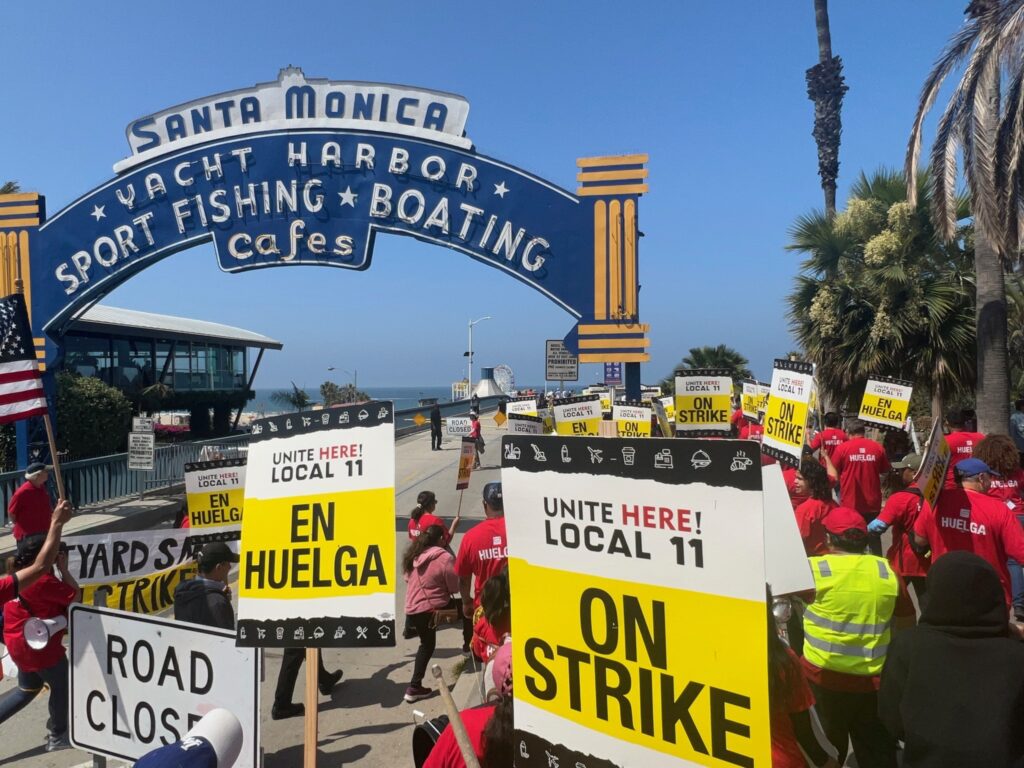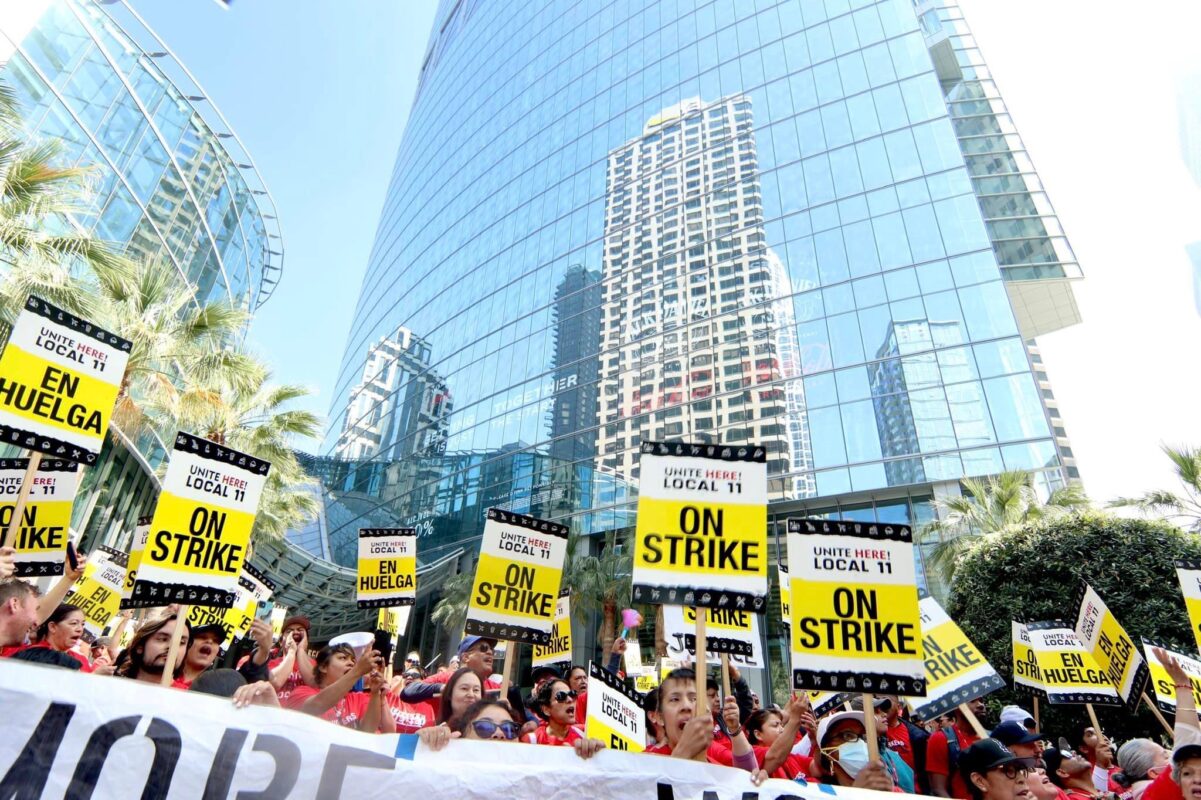Skift Take
Hospitality workers at 61 Southern California hotels are on strike, demanding higher pay and better benefits. Meetings are being severely impacted as groups try to navigate the challenging situation.
A massive hotel worker strike in Southern California is impacting meetings across the region. The vote to strike involves 61 Southern California hotels, including properties owned by major chains such as Marriott and Hilton, and about half of the 32,000 hospitality workers Unite Here represents across Southern California and Arizona who are demanding higher pay and better benefits.
Events Pulling Out
The ongoing strike impacted the BUILD Initiative‘s annual conference, scheduled for July 11-13, with 1,430 registrants at the Anaheim Hilton.
“We are just decimated,” said Susan G. Hibbard, executive director of BUILD, an organization that supports child and family serving systems. “We were so excited to be together.” This would have been the organization’s first in-person gathering since the Covid pandemic led to the cancellation of its 2020 conference in Orlando.
“Our attendees are very similar to the workforce impacted by this strike. There is no way we could hold a meeting in the middle of a labor dispute involving people serving people,” said Hibbard. “A year’s worth of work has fallen apart like a deck of cards.”
All the pieces were in place for an extremely successful conference with record-breaking attendance. There were 1,200 who gathered in 2019, and the goal was to have a conservative 1,000 this year. The overwhelming excitement at the prospect of meeting in person once again led to 1,430 registering from 48 states, two U.S. territories, and dozens of tribes.
One-hundred-and-fifty sessions with three plenaries, peer-to-peer sessions, consultations, and hot topics were ready to go. Hibbard’s team is scrambling to create some smaller virtual meetings for next week, with a larger one to follow in November before the possibly rescheduled in-person conference.
Tough Conversations With the Hotel
The Anaheim Hilton hasn’t been as understanding as Hibbard had hoped. “They told me they are fully prepared to remain open, and the level of service will be just fine, and we could come and have the meeting. Our attendees wouldn’t even notice, they said. I stressed that under no circumstance would we cross a picket line,” explains Hibbard.
Unfortunately, her contract does not protect her from labor disputes. “We are contractually obligated for $600,000 in food, beverage, and rooms. The hotel gave us new dates in November, right after Thanksgiving. That is assuming a contract will be in place,” she said.
Although the overwhelming response from attendees has been positive and empathetic, some are still navigating the cancellation. “Some attendees have booked their vacations around our conference and don’t know what to do now,” she said. “There is still a lot to untangle.”
She has been in touch with several attorneys but has been told the same thing. Her force majeure or impossibility clause does not include strikes. “I thought we learned so much about contracts from Covid but now realize we were looking at it too narrowly. That will change.”
Who is Striking?
Contracts expired on June 30th at 61 Southern California hotels, including the Fairmont Miramar in Santa Monica, the Beverly Wilshire in Beverly Hills, the JW Marriott LA Live in downtown Los Angeles, the Sheraton Universal in Universal City, and the Laguna Cliffs Marriott in Dana Point.
Thousands of cooks, room attendants, dishwashers, servers, bell staff, and front desk agents walked out this weekend during the first wave of strikes. They are seeking higher pay and improved benefits.
“Workers will not rest until they are paid a wage that allows them to live in the communities where they work,” according to Kurt Petersen, co-president of Unite Here Local 11, a union representing more than 32,000 hospitality workers across Southern California and Arizona.
The union said its workers earn 20 to 25 dollars an hour now, but because the high cost of living in Southern California has made it difficult for many hotel workers to afford housing, they want an immediate increase of five dollars an hour and an additional three dollars an hour in each subsequent year of the contract, plus improved healthcare and retirement benefits. Unite Here also wants a hospitality-workforce housing fund, which would come from a new seven-percent tax on guests.
Some Progress Made
There has been some progress as last week, the largest of the 65 affected properties, the Westin Bonaventure Hotel & Suites in downtown Los Angeles, reached a tentative deal for higher pay and benefits for its more than 600 workers.
“As a result, the Bonaventure has become the most sought-after hotel in the city,” said Petersen. “I have heard of groups moving out of the Intercontinental into the Bonaventure because it is safe, and a contract is in place.”
Meeting professionals should take heed, added Petersen. “We have put the industry on notice that the workers have suffered enough,” he said. “We had our first wave of strikes this weekend and will have another wave soon. Planners should be very cautious bringing groups to any of the 61 hotels.”

A Difficult Moment for Los Angeles
Los Angeles still hasn’t fully rebounded from the pandemic; therefore, an extended hotel strike can be disastrous. “Los Angeles already has a difficult reputation because of the homeless issue, the lack of safety downtown, and costs being driven up,” said Pete Hillan, a spokesperson for the Hotel Association of Los Angeles, an industry trade group.
He points to the Hotel Worker Protection Ordinance that limits the daily workload of housekeepers. As workloads are cut, and there is not enough staff, housekeepers are earning double-time, in some cases $50 to $60 an hour, reports Hillan, increasing hotel rates.
“It’s difficult for meeting planners to have confidence that their group’s stay in Los Angeles will not be disrupted by this strike or will not be overly expensive,” said Hillan. “This is a difficult moment for L.A. It may be easier for these big conventions to find destinations where they know they will not be disrupted.”
Some Events Go Ahead As Planned
The largest anime convention in North America, Anime Expo, took over the Los Angeles Convention Center this weekend with some attendees complaining about having to cross picket lines to get to their hotels.
“There was noise outside some of the hotels, but they provided all the services the guests signed up for as they have contingency plans and backup staffing,” said Hillan. Some hotels have reallocated staff from properties not involved in the strike, and in some cases, managers have stepped in to help, Hillan added.
What Can Planners Do?
Communication is always the key. That is the primary thing planners should consider from a legal perspective, according to hospitality attorney Lisa Sommer Devlin. “Talk to your sales manager, convention services agent, or, if necessary, the general manager to find out the status of their operations and what the hotel can and cannot provide for your event,” said Devlin.
“Review the terms of your contract carefully to see what rights you may have. There is no hard and fast answer, as it depends on the specifics of your event and when it is scheduled,” said Devlin.





